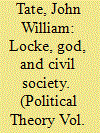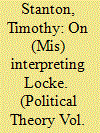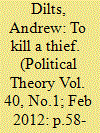| Srl | Item |
| 1 |
ID:
101841


|
|
|
|
|
| Publication |
2011.
|
| Summary/Abstract |
This essay argues that many modern discussions of Locke's political theory are unconsciously shaped by an imaginative picture of the world inherited from the past, on which authority and freedom are fundamentally antipathetic. The consequences of this picture may be seen in the distinction made customarily in Locke studies between the 'authoritarian' Locke of Two Tracts on Government, for whom authority descends from God, and the later, 'liberal,' Locke, for whom authority arises from the will and agreement of individuals, and felt in the emphases placed on consent and resistance in most interpretations of Lockean political thought. The essay examines the composition and contours of this picture and, by holding up a mirror to contemporary Locke scholarship, draws attention to some of the ways in which it unwittingly distorts Locke's thinking.
|
|
|
|
|
|
|
|
|
|
|
|
|
|
|
|
| 2 |
ID:
112368


|
|
|
|
|
| Publication |
2012.
|
| Summary/Abstract |
Timothy Stanton is the latest in a line of Locke scholars who, in focusing on Locke's theological commitments, have sought to place these at the center of his political philosophy. Stanton insists that those who interpret Locke's political philosophy in more material terms, centered on individual liberty, government authority, and the need to reconcile both via consent, apply to it a misleading "picture" and fail to perceive its essentials. By showing that this is precisely how Locke himself intended his political philosophy to be understood, with the theology substantially removed, this article shows how Stanton is profoundly mistaken in his interpretation of Locke.
|
|
|
|
|
|
|
|
|
|
|
|
|
|
|
|
| 3 |
ID:
112369


|
|
|
| 4 |
ID:
109941


|
|
|
|
|
| Publication |
2012.
|
| Summary/Abstract |
This essay argues that the thief, a liminal figure that haunts the boundary of political membership and the border between the law of reason and the law of beasts, drives Locke's accounts of the foundation of the commonwealth and the right to rebellion in the Second Treatise of Government. Locke's political theory is best read through punishment as a theory of subject formation, which relies on an unstable concept of proportionality to produce this liminal figure in order to secure the member as a "stable" political subject.
|
|
|
|
|
|
|
|
|
|
|
|
|
|
|
|